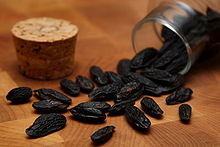Tonka Bean
| Dipteryx odorata | |
|---|---|
 |
|
| Tonka beans | |
| Scientific classification | |
| Kingdom: | Plantae |
| (unranked): | Angiosperms |
| (unranked): | Eudicots |
| (unranked): | Rosids |
| Order: | Fabales |
| Family: | Fabaceae |
| Genus: | Dipteryx |
| Species: | D. odorata |
| Binomial name | |
|
Dipteryx odorata (Aubl.) Willd. |
|
| Synonyms | |
|
Coumarouna odorata Aubl. |
|
Coumarouna odorata Aubl.
Coumarouna tetraphylla (Benth.) Aubl.
Dipteryx tetraphylla Benth.
Dipteryx odorata (commonly known as "cumaru" or "kumaru") is a species of flowering tree in the pea family, Fabaceae. The tree is native to Central America and northern South America. Its seeds are known as tonka beans (sometimes tonkin beans or tonquin beans). They are black and wrinkled and have a smooth, brown interior. They have a strong fragrance similar to sweet woodruff (Galium odoratum) due to their high content of coumarin.
The word "tonka" is taken from the Galibi (Carib) tongue spoken by natives of French Guiana; it also appears in Tupi, another language of the same region, as the name of the tree. The old genus name, Coumarouna, was formed from another Tupi name for tree, kumarú.
The tree grows up to 25–30 meters, with a trunk of up to one meter in diameter. The tree bark is smooth and gray, whereas the wood is red. The tree has alternate pinnate leaves with three to six leaflets, leathery, glossy and dark green, and pink flowers. Each developed fruit contains one seed. D. odorata is pollinated by insects. The worst pests are the bats because they eat the pulpy flesh of the fruit. A few known fungi may cause problems: Anthostomella abdita, Diatrype ruficarnis, Macrophoma calvuligera and Myiocopron cubense.
The tonka seed contains coumarin, a chemical isolate from this plant, which also gave the name to it. The seeds normally contain about 1 to 3% of coumarin, but rarely it can achieve 10%. Coumarin is responsible for the seed's pleasant odor and is used in the perfume industry. Coumarin is bitter to the taste, however, and, in large infused doses, it may cause hemorrhages, liver damage, or paralysis of the heart. It is therefore controlled as a food additive by many governments. Like a number of other plants, the tonka bean plant probably produces coumarin as a defense chemical. Radio-carbon dating of D. odorata stumps left by a large logging operation near Manaus by Niro Higuchi, Jeffrey Chambers, and Joshua Schimel, showed that it was one of around 100 species which definitely live to over 1,000 years. Until their research, it had been assumed unlikely that any Amazonian tree could live to old age due to the conditions of the rain forest.
...
Wikipedia
